Introduction
Whether you’re planning a new initiative, running product delivery, or managing multi-department programs, Proggio helps you visualize your entire work plan on one collaborative map.
You can easily switch between high-level timelines and detailed task reports, keeping strategy and execution aligned at all times.
Section 1: Structuring the Project with the ProjectMap™ Timeline
The Timeline View (ProjectMap™) is the foundation of your project — organizing workstreams, setting schedules, and defining relationships between tasks and milestones.
1. Workstreams (High-Level Structure)
Workstreams represent functional areas, departments, or teams, helping clarify ownership and keep the project organized.
| Action | How to Do It | Details |
|---|---|---|
| Add a Workstream | Click the + Add Workstream button at the bottom of the workstream list. | You can also use Proggio.AI to suggest relevant workstreams based on your project’s context. |
| Add a Grouped Workstream | Hover over a workstream and click Add Grouped Workstream. | Enables parallel or nested workstreams (e.g., Development → Frontend + Backend). |
| Edit Properties | Hover and click the edit icon to rename, recolor, or assign an owner. | Helps visually differentiate teams or departments. |
| Add a Visual Divider | Right-click between workstreams and select Add Divider.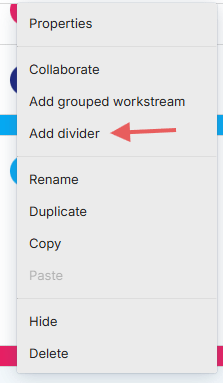 | Separates departments, phases, or major deliverables for clarity. |
💡 Best Practice: Keep your workstreams broad (e.g., “Engineering”, “Design”, “Marketing”) rather than individual people. This keeps the timeline cleaner and helps track ownership by team rather than individual effort.
2. Adding and Managing Tasks
Each block on the ProjectMap represents a task, and its length corresponds to its duration.
| Action | How to Do It | Details |
|---|---|---|
| Add a Task | Hover over an empty timeline space → click + Add Task or the ✨ Stars to use AI. | The split panel opens for editing task name, dates, and assignments. |
| Add Backlog Tasks | Click Create → Add Backlog Task.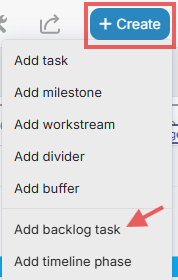 | Ideal for collecting unscheduled items to plan later. |
| Move & Resize Tasks | Drag and drop tasks or resize their bars. | Changes task dates, automatically adjusts dependencies if linked. |
| View / Edit Full Properties | Hover and click the i icon. | Opens the task’s detailed fields such as description, labels, risk, and dependencies. |
3. Dependencies and Milestones
Dependencies define how tasks relate to one another, while milestones mark major achievements.
| Action | How to Do It | Details |
|---|---|---|
| Create Dependencies | Drag the blue arrow from one task to another.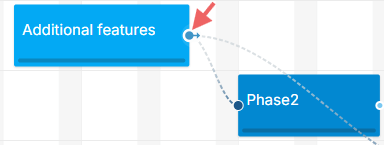 | Ensures linked tasks shift together when rescheduled. |
| Add a Milestone | Double-click anywhere on the timeline’s date row. | Milestones appear as colored flags (e.g., “Launch”, “Review Complete”). |
| Edit Milestones | Click a milestone flag to rename or recolor it.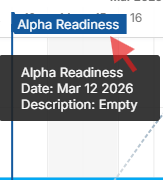 | Keeps your timeline visually informative. |
Section 2: Managing Tasks Efficiently
Managing task execution in Proggio can be done either within a single project or across multiple projects in your portfolio.
At the project level, you’ll see and manage tasks belonging only to that project.
At the Task Report level, the report aggregates all tasks you are permitted to see across projects, allowing unified progress tracking, reporting, and quick updates across an entire portfolio.
1. Filtering Your Tasks
Filters help you narrow focus to the most relevant tasks — whether by project, status, assignee, date, or priority.
- Click Add a Filter, or if it’s not visible, click the filter icon to open the filter panel.
![]()
- You can combine multiple filters to refine results in Dynamic Map, Board, or List views.
- Once filters and layout preferences are configured, click Save As to create a personal or shared saved view for future use.
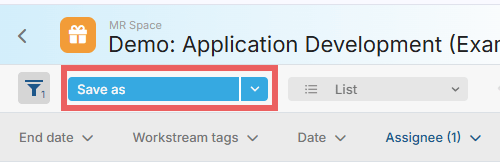
2. Task Management Views
Proggio offers several ways to view and manage tasks, each optimized for a different workflow style.
All views support inline editing, quick status updates, and live syncing with your project data.
A. Timeline View (ProjectMap™)
The Timeline Map View is where you structure your project and manage tasks in context. Clicking on a task block opens a split-screen panel with detailed task information, allowing quick edits without leaving the timeline.
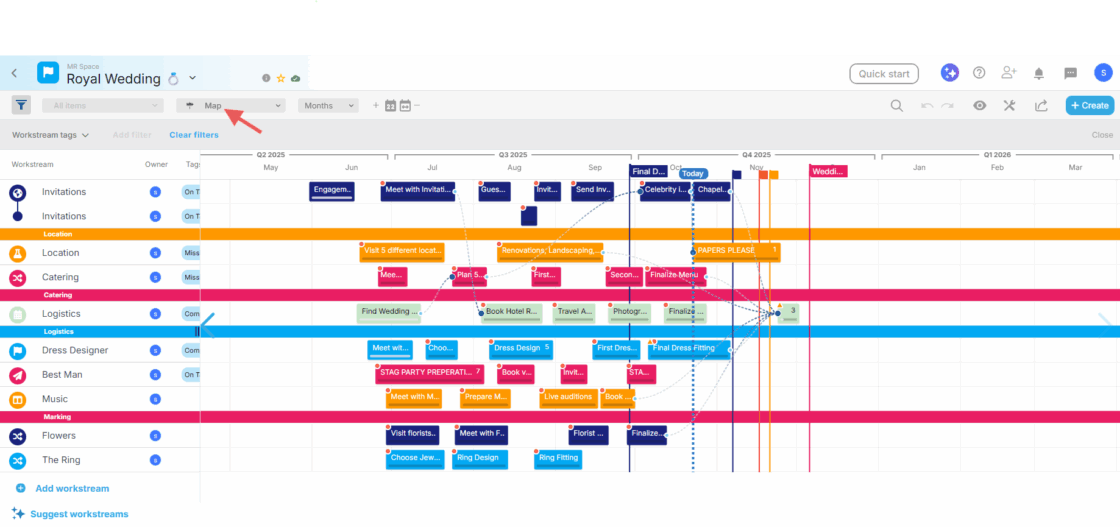
Navigation and Zooming
- Zooming: Hover over the date area and scroll with your mouse wheel to adjust the timeline scale.
- Navigation: Use the calendar icons at the top to fit all tasks on screen or jump to today’s date.
![]()
Task Details and Progress
- Quick Edits: Click a task block to open the task details in a split-screen view where you can update the task’s name, assignee, dates, and metadata.

- Progress Bar: Slide to adjust the task’s completion percentage.

- Automatic Status Updates: Status updates automatically according to your space’s task status percentage configuration, which can be viewed and configured under Settings ⚙ > Workflows > Tasks.
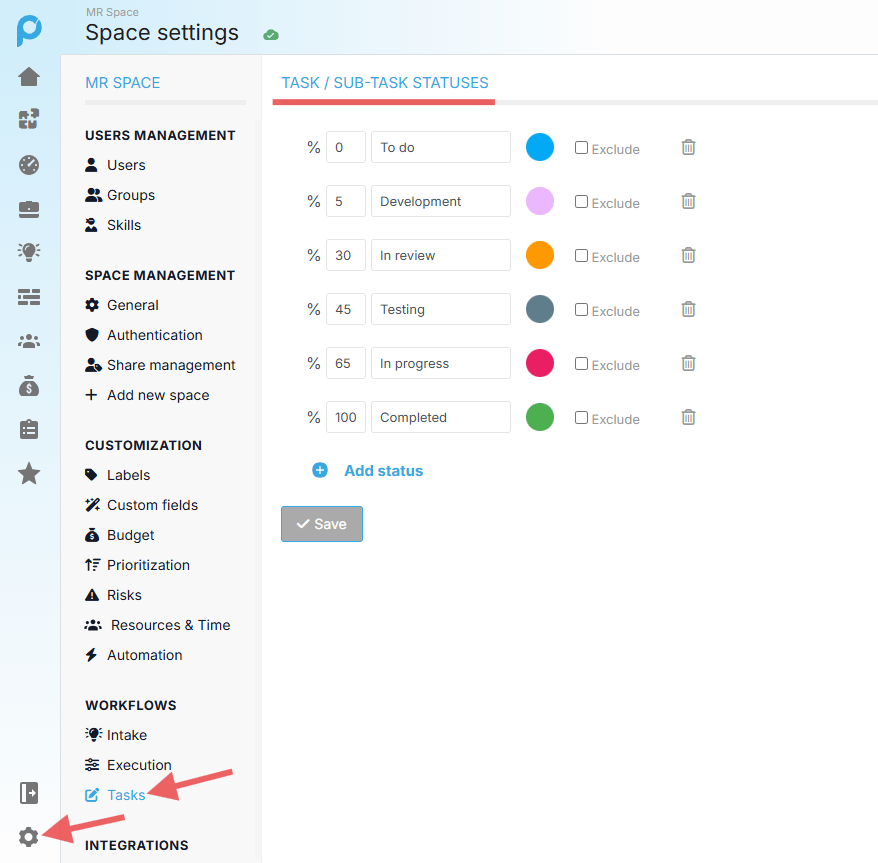
B. Board View (Kanban)
The Board View provides a Kanban-style visualization for workflow management, helping you see task progress at a glance.
- Grouping: Use the Group By dropdown to organize tasks by Status, Priority, Labels, Assignees, and more.
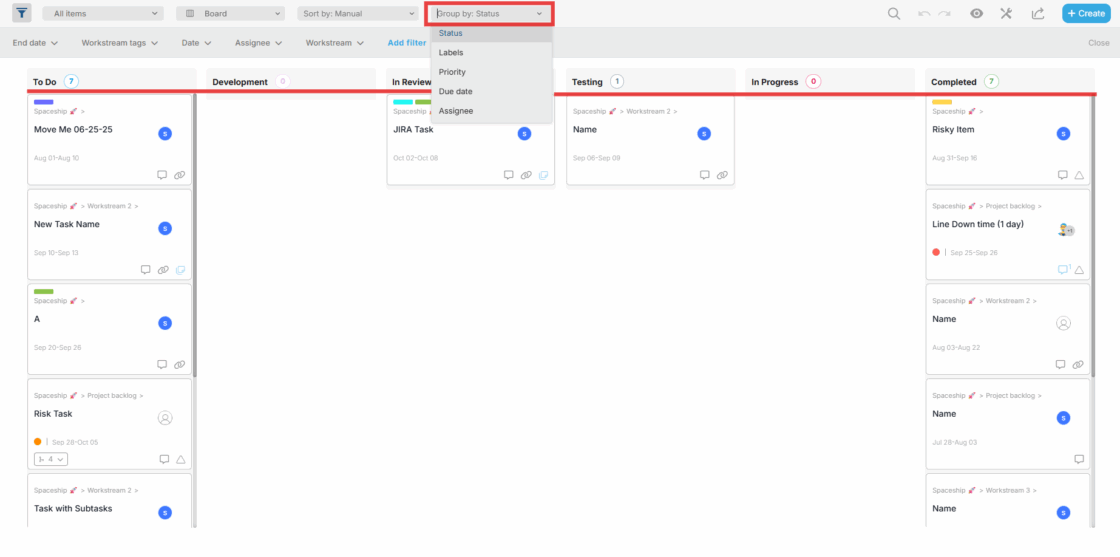
- Updating Progress: Drag and drop tasks between columns (e.g., To Do → In Review) to update their status automatically.
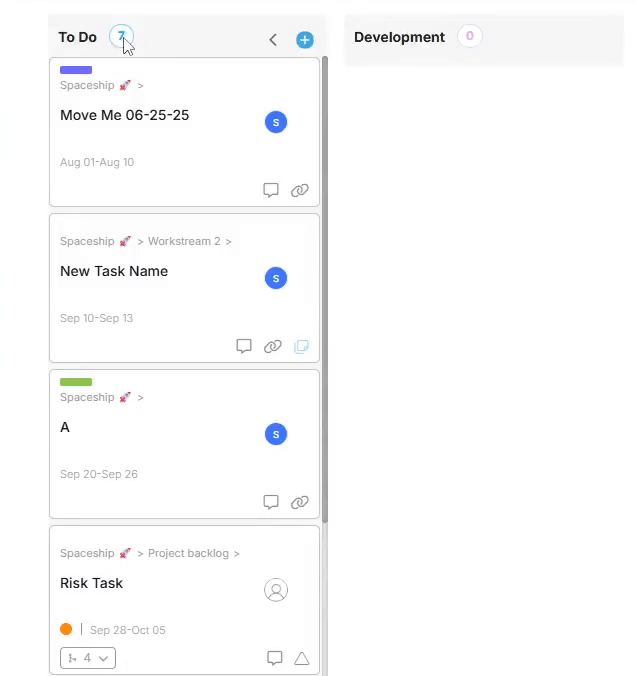
- Adding Tasks: Click the + icon next to a column title to create a new task directly within that group.
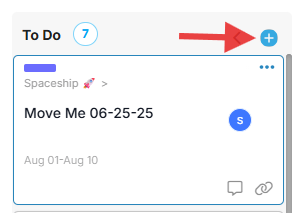
C. List View (Spreadsheet)
The List View offers a spreadsheet-like interface for scanning and editing large volumes of tasks.
- Customize Columns: Click the eye icon in the top-right corner and select “Show/Hide Columns” to display additional data like Created By, Created Date, or Workstream.
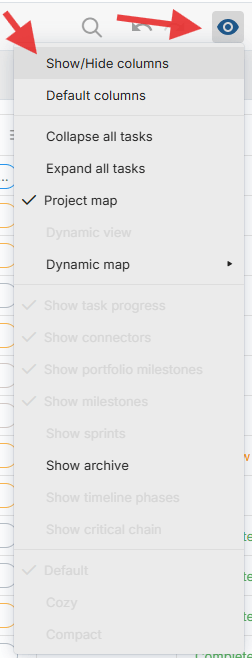
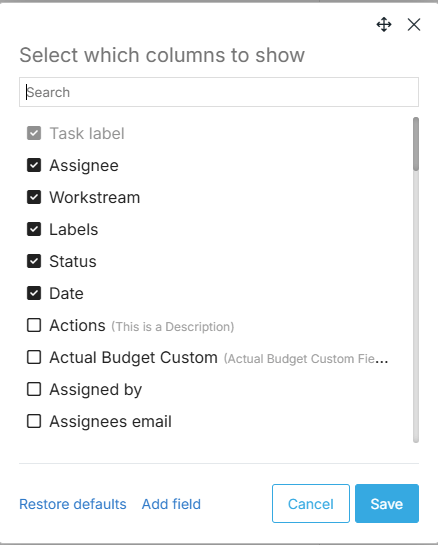
- Inline Editing: Update fields such as Status, Assignee, Start/End Dates, and Labels directly from the table without opening the task card.

D. Backlog Management
Backlog tasks are tasks that aren’t assigned a date or workstream and therefore don’t appear on the Timeline. You can still manage these tasks directly within your project.
- Accessing Backlog Tasks: Backlog tasks can be viewed and managed from the project interface.
- Scheduling Backlog Tasks: When ready, drag backlog tasks onto the timeline or assign them to a workstream.
For a detailed guide on managing backlog tasks, refer to our manual: Managing Backlog Tasks.
3. Choosing Between Project View and Task Report
| Use Case | Recommended Area | Why |
|---|---|---|
| Managing daily tasks within a single project | Project-Level View | Keeps focus on that project’s timeline, workstreams, and assigned team. |
| Tracking tasks across multiple projects or departments | Task Report | Provides a unified, cross-project overview with filters and saved views. |
| Reviewing workload balance or spotting bottlenecks | Task Report (Dynamic Map) | Visualizes task distribution, dependencies, and workload across teams. |
| Running quick updates for a specific team’s work | Project or Task Report (Board View) | Drag and drop tasks to update statuses instantly, keeping progress visible. |
4. Key Takeaway
No matter where you manage tasks — in a single project or in the Task Report — the tools are consistent.
Choose Project View for focused, context-specific management, and Task Report for cross-project visibility and high-level control.
Section 3: Collaborating with Your Team
Proggio is built for collaboration, ensuring everyone has visibility and accountability.
Assign Work: Use the Assignee field in task properties to allocate responsibility.
Tag Users: Mention teammates in task comments using @username.
Track Ownership: Filter by assignee or department to review workloads.
Invite New Users: Go to Settings → Users, then click Invite User. Assign roles such as Project Manager, Contributor, or Viewer.
For more information about inviting and managing users please refer to our dedicated tutorial – Inviting and Managing Users in Proggio
Section 4: Using AI Assistance
Proggio.AI and Timeline GPT functions enhances project setup and optimization:
Suggest Workstreams: Click the ✨ icon at the bottom of the workstream list.
Generate Tasks or Subtasks: Hover over a workstream → click ✨ → Generate Tasks with AI.
Restructure Plans: In the AI chat, request adjustments (e.g., “Shift marketing phase by 2 weeks”).
Use AI in Context: The Timeline GPT AI can analyze dependencies, milestones, and workloads for improvement.
For a more detailed tutorial on Timeline GPT and Proggio.AI please refer to our dedicated tutorial here – Timeline GPT: Your AI Partner for Project Fulfillment
Section 5: Monitoring, Reports, and Insights
- Portfolio Dashboard: Access from the left menu to view all projects and their health status.
Please refer to our dedicated tutorial to learn more – Creating and Managing Dashboards in Proggio
Status Reports: Use saved filters (e.g., “At Risk Tasks”) to generate real-time reports.
Export/Share Options: Export task lists or timelines to Excel, PowerPoint Presentation, or share the current view with other users via email.
Please refer to our dedicated tutorial on exporting your project data to a PowerPoint Presentation here – Exporting Your Projects to a PowerPoint Presentation
Pro Tip: Use ProjectMap™ for strategic planning and Task Report for execution tracking — switching between them provides both the big picture and the daily action view.
Final Tips & Key Actions
A quick reference to Proggio’s essential tools and features, helping you manage projects efficiently and stay on top of tasks:
1. Structure Your Project
Workstreams: Organize by teams, departments, or phases.
Tasks & Milestones: Add tasks, define durations, and set milestones.
Dependencies: Link tasks to ensure changes propagate automatically.
2. Manage Tasks Efficiently
Timeline View: Edit tasks inline, adjust dates, and track progress.
Board View: Drag & drop tasks across columns for Kanban-style updates.
List View: Bulk edit, sort, and filter tasks in a spreadsheet-style interface.
Backlog Tasks: Collect unscheduled tasks for future planning.
3. Collaborate With Your Team
Assign Work: Allocate tasks using the Assignee field.
Tag & Notify: Use @mentions to communicate in context.
Invite Users: Add teammates with Project Manager, Contributor, or Viewer roles.
4. Use AI Assistance
Suggest Workstreams: Let Timeline GPT propose relevant workstreams.
Generate Tasks/Subtasks: AI can create detailed tasks automatically.
Restructure Plans: Ask AI to shift phases, extend timelines, or optimize workloads.
5. Monitor Progress & Insights
Portfolio Dashboard: Track health and progress across all projects.
Reports: Generate real-time status reports using saved filters.
Export & Notify: Export to Excel/PowerPoint and enable alerts for key deadlines.
Pro Tip: Combine the ProjectMap™ Timeline for strategic planning and the Task Report for day-to-day execution — switch between them for a complete project view.
Need Help?
For more help, feel free to contact us anytime at [email protected]